How can economic leaders help the world´s poorest people? O dicho de otro modo: ¿Cómo pueden los líderes económicos ayudar a los más pobres? El fundador de Microsoft, Bill Gates (@billgates), muy centrado en su filosofía filantrópica de ayuda a los más desfavorecidos, señala a través de la web de The Gates Notes sus 5 libros recomendados al respecto.
Hoy en la sección Recopilaciones os dejamos estos 5 libros (algunos traducidos al español):
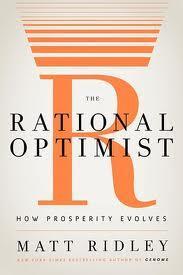 The Rational Optimist, Matt Ridley. For 200 years the pessimists have dominated public discourse, insisting that things will soon be getting much worse. But in fact, life is getting better—and at an accelerating rate. Food availability, income, and life span are up; disease, child mortality, and violence are down all across the globe. Africa is following Asia out of poverty; the Internet, the mobile phone, and container shipping are enriching people's lives as never before. In his bold and bracing exploration into how human culture evolves positively through exchange and specialization, bestselling author Matt Ridley does more than describe how things are getting better. The author explains why. An astute, refreshing, and revelatory work that covers the entire sweep of human history —from the Stone Age to the Internet— The Rational Optimist will change your way of thinking about the world for the better.
The Rational Optimist, Matt Ridley. For 200 years the pessimists have dominated public discourse, insisting that things will soon be getting much worse. But in fact, life is getting better—and at an accelerating rate. Food availability, income, and life span are up; disease, child mortality, and violence are down all across the globe. Africa is following Asia out of poverty; the Internet, the mobile phone, and container shipping are enriching people's lives as never before. In his bold and bracing exploration into how human culture evolves positively through exchange and specialization, bestselling author Matt Ridley does more than describe how things are getting better. The author explains why. An astute, refreshing, and revelatory work that covers the entire sweep of human history —from the Stone Age to the Internet— The Rational Optimist will change your way of thinking about the world for the better.
Disponible en español en: Casa del Libro / FNAC / Amazon
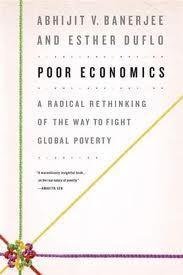 Poor Economics: A Radical Rethinking of the Way to Fight Global Poverty, Abhijit Banerjee. Billions of government dollars, and thousands of charitable organizations and NGOs, are dedicated to helping the world's poor. But much of their work is based on assumptions that are untested generalizations at best, harmful misperceptions at worst. Abhijit Banerjee and Esther Duflo have pioneered the use of randomized control trials in development economics. Work based on these principles, supervised by the Poverty Action Lab, is being carried out in dozens of countries. Drawing on this and their 15 years of research from Chile to India, Kenya to Indonesia, they have identified wholly new aspects of the behavior of poor people, their needs, and the way that aid or financial investment can affect their lives. Their work defies certain presumptions: that microfinance is a cure-all, that schooling equals learning, that poverty at the level of 99 cents a day is just a more extreme version of the experience any of us have when our income falls uncomfortably low. This important book illuminates how the poor live, and offers all of us an opportunity to think of a world beyond poverty.
Poor Economics: A Radical Rethinking of the Way to Fight Global Poverty, Abhijit Banerjee. Billions of government dollars, and thousands of charitable organizations and NGOs, are dedicated to helping the world's poor. But much of their work is based on assumptions that are untested generalizations at best, harmful misperceptions at worst. Abhijit Banerjee and Esther Duflo have pioneered the use of randomized control trials in development economics. Work based on these principles, supervised by the Poverty Action Lab, is being carried out in dozens of countries. Drawing on this and their 15 years of research from Chile to India, Kenya to Indonesia, they have identified wholly new aspects of the behavior of poor people, their needs, and the way that aid or financial investment can affect their lives. Their work defies certain presumptions: that microfinance is a cure-all, that schooling equals learning, that poverty at the level of 99 cents a day is just a more extreme version of the experience any of us have when our income falls uncomfortably low. This important book illuminates how the poor live, and offers all of us an opportunity to think of a world beyond poverty.
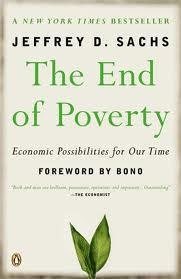 The End of Poverty: Economic Possibilities for Our Time, Jeffrey Sachs. Among the most eagerly anticipated books of any year, this landmark exploration of prosperity and poverty distills the life work of an economist Time calls one of the world’s 100 most influential people. Sachs’s aim is nothing less than to deliver a big picture of how societies emerge from poverty. To do so he takes readers in his footsteps, explaining his work in Bolivia, Russia, India, China, and Africa, while offering an integrated set of solutions for the interwoven economic, political, environmental, and social problems that challenge the poorest countries. Marrying passionate storytelling with rigorous analysis and a vision as pragmatic as it is fiercely moral, The End of Poverty is a truly indispensable work.
The End of Poverty: Economic Possibilities for Our Time, Jeffrey Sachs. Among the most eagerly anticipated books of any year, this landmark exploration of prosperity and poverty distills the life work of an economist Time calls one of the world’s 100 most influential people. Sachs’s aim is nothing less than to deliver a big picture of how societies emerge from poverty. To do so he takes readers in his footsteps, explaining his work in Bolivia, Russia, India, China, and Africa, while offering an integrated set of solutions for the interwoven economic, political, environmental, and social problems that challenge the poorest countries. Marrying passionate storytelling with rigorous analysis and a vision as pragmatic as it is fiercely moral, The End of Poverty is a truly indispensable work.
Disponible en español en: Casa del Libro / FNAC / Amazon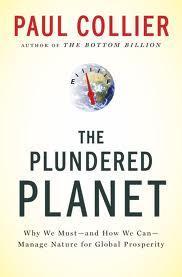 The Plundered Planet, Paul Collier. Paul Collier's The Bottom Billion was greeted as groundbreaking when it appeared in 2007, winning the Estoril Distinguished Book Prize, the Arthur Ross Book Award, and the Lionel Gelber Prize. Now, in The Plundered Planet, Collier builds upon his renowned work on developing countries and the world's poorest populations to confront the global mismanagement of natural resources. Proper stewardship of natural assets and liabilities is a matter of planetary urgency: natural resources have the potential either to transform the poorest countries or to tear them apart, while the carbon emissions and agricultural follies of the developed world could further impoverish them. The Plundered Planet charts a course between unchecked profiteering on the one hand and environmental romanticism on the other to offer realistic and sustainable solutions to dauntingly complex issues. Grounded in a belief in the power of informed citizens, Collier proposes a series of international standards that would help poor countries rich in natural assets better manage those resources, policy changes that would raise world food supply, and a clear-headed approach to climate change that acknowledges the benefits of industrialization while addressing the need for alternatives to carbon trading. Revealing how all of these forces interconnect, The Plundered Planet charts a way forward to avoid the mismanagement of the natural world that threatens our future.
The Plundered Planet, Paul Collier. Paul Collier's The Bottom Billion was greeted as groundbreaking when it appeared in 2007, winning the Estoril Distinguished Book Prize, the Arthur Ross Book Award, and the Lionel Gelber Prize. Now, in The Plundered Planet, Collier builds upon his renowned work on developing countries and the world's poorest populations to confront the global mismanagement of natural resources. Proper stewardship of natural assets and liabilities is a matter of planetary urgency: natural resources have the potential either to transform the poorest countries or to tear them apart, while the carbon emissions and agricultural follies of the developed world could further impoverish them. The Plundered Planet charts a course between unchecked profiteering on the one hand and environmental romanticism on the other to offer realistic and sustainable solutions to dauntingly complex issues. Grounded in a belief in the power of informed citizens, Collier proposes a series of international standards that would help poor countries rich in natural assets better manage those resources, policy changes that would raise world food supply, and a clear-headed approach to climate change that acknowledges the benefits of industrialization while addressing the need for alternatives to carbon trading. Revealing how all of these forces interconnect, The Plundered Planet charts a way forward to avoid the mismanagement of the natural world that threatens our future.
Disponible en español en: Casa del Libro / FNAC / Amazon
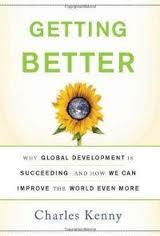 Getting Better, Charles Kenny. As the income gap between developed and developing nations grows, so grows the cacophony of voices claiming that the quest to find a simple recipe for economic growth has failed. Getting Better, in sharp contrast, reports the good news about global progress. Kenny argues against development naysayers by pointing to the evidence of widespread improvements in health, education, peace, liberty and even happiness. Kenny shows how the spread of cheap technologies, such as vaccines and bed nets, and ideas, such as political rights, has transformed the world. He also shows that by understanding this transformation, we can make the world an even better place to live. That's not to say that life is grand for everyone, or that we don't have a long way to go. But improvements have spread far, and, according to Kenny, they can spread even further.
Getting Better, Charles Kenny. As the income gap between developed and developing nations grows, so grows the cacophony of voices claiming that the quest to find a simple recipe for economic growth has failed. Getting Better, in sharp contrast, reports the good news about global progress. Kenny argues against development naysayers by pointing to the evidence of widespread improvements in health, education, peace, liberty and even happiness. Kenny shows how the spread of cheap technologies, such as vaccines and bed nets, and ideas, such as political rights, has transformed the world. He also shows that by understanding this transformation, we can make the world an even better place to live. That's not to say that life is grand for everyone, or that we don't have a long way to go. But improvements have spread far, and, according to Kenny, they can spread even further.
Revista Coaching
Sus últimos artículos
-
Entrevista a Gemma Ramírez (188), autora de «Claves del coaching»
-
Entrevista a Guillem Recolons (187), autor de «Si no aportas, no importas»
-
Entrevista a Alfonso Miñarro (186), autor de «Acortando distancias»
-
Entrevista a Javier Dols Juste (185), autor de «Tu mejor medicina eres tú»

